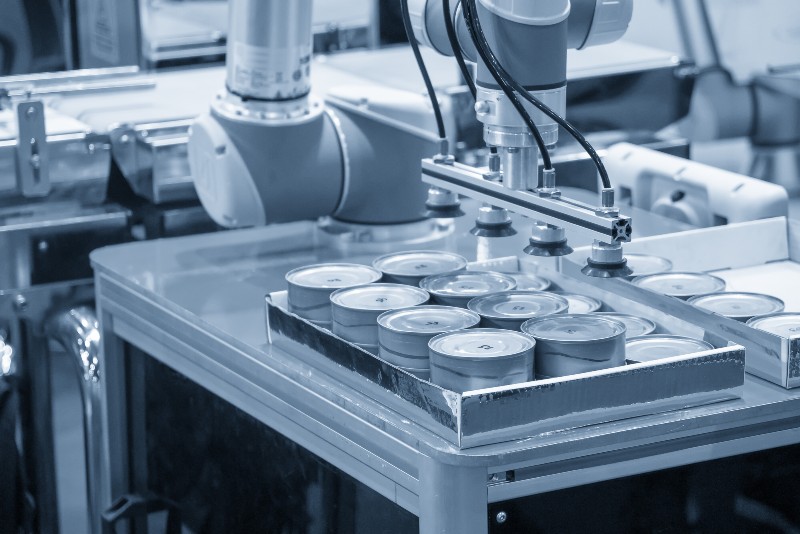One of the most important sectors in the world, the food processing and handling industry is on the path of constant evolution, with novel trends and technologies popping up all the time. Human labor is critical to the effective execution of food product production and packaging. On the other hand, food processing companies also face challenging situations as they fail to sustain the demand-supply cycle. Industrial automation is the ideal solution that can help address the growing challenges in this industry.
Artificial intelligence (AI), machine learning (ML), and deep learning (DL) algorithms are at the heart of automation. Adoption of AI-based technology systems in the food industry helps in efficient and effective handling of food manufacturing and distribution procedures. Food processing companies can combine RPA and AI to fully automate their operations from end to end, and for this they can rely on business process outsourcing services.
Automation Taking the Center Stage
The global COVID-19 pandemic has changed the eating patterns of people. Rather than going to dine, more and more people prefer to order in. This has resulted in an ever-growing demand for at home food delivery and takeout services. When most people think of utilizing AI technology in kitchens manned with robots capable of cooking, they tend to form a picture that the technology will eventually replace all human employees. That is no longer an impossible scenario as there are actual restaurants in the world that have robots doing at least some of the cooking. However, this isn’t the most prevalent manner that AI is transforming the food processing industry. AI has been optimizing, automating, and improving the food business.
Here discussed are some of the benefits of using AI Solutions in the food processing industry –
- Cost Saving – AI technology can be used to automate simple and rote tasks (like taking bulk orders). This means less money spent on staffing and reducing costs on an overall basis.
- Reduce Errors – Human error accounts for a lot of things in any business. With AI technology, chances of miscommunication get nullified as most of the ordering process takes place via machines.
- Find New Customers – AI technology can boost the marketing efforts of any business, identifying the type of customers and reaching out to customers.
- Customize Orders – AI gives more control to guests during the ordering process. This allows them to customize their orders (and their overall experience) to fit their needs.
- Increase the Market Reach – With AI technology, it is possible to reach out to new customers, even outside the reach of the business. It will help with upsell and even make use of automation for better suggestions.
Key Applications of AI in the Food Sector
With advances in technology, AI has become more accessible than ever before. Here discussed are some of the key application areas of AI in the food sector –
- Kiosks – Ordering kiosks have become a fairly common feature that helps personalize customer experiences. For instance, KFC is experimenting with kiosks with facial recognition technology that can recognize repeat visitors and alter their experience based on their past orders and preferences. AI can be used in online ordering and digital marketing areas to help personalize the dining experience of guests. Online ordering and digital marketing are two venues where restaurants are more commonly collecting guest data, and then using that data to provide personalized service, from dish recommendations to targeted marketing.
- Voice Ordering – Reports suggest that about 27 percent of all online people now use voice search and nearly 40 percent prefer voice search over their smartphones when searching for nearby food units. As voice assistants have become more popular, Amazon Alexa, Google Home, and Siri can help users accomplish these complex tasks very easily. Voice ordering enables guests to use their smart devices to place restaurant orders on the go or while multitasking. In addition, this application can be implemented at self-service kiosks or in drive-thrus, allowing guests to place orders conversationally, without touching anything – which is a great safety measure in the pandemic age.
- AI Phone Answering – A recent survey conducted by Popmenu found that a staggering 83 percent of customers will move on and find another restaurant if they try to call and get voicemail more than once. This is where the significance of adopting AI technology arises as it helps avoid missing customers’ calls. AI phone answering technology can take messages, make reservations, add guests to the waitlist, or even answer commonly asked questions.
- AI Chatbots – Typically, websites use chatbots for tech support. Food outlets use AI technology to respond to customer queries, and manage orders and reservations. Chatbots reply in the form of typed messages and offer suggestions, provide feedback, and make confirmations for the queries. With the increasing influence of voice-command technology, there are chatbots that will revert back to the users through voice messages.
How the Usage of AI Technology Is Impacting the Food Industry
With technology of all kinds becoming an integral part of food industry, AI is emerging as a leader with virtually limitless potential. There are several possibilities wherein AI has been optimizing, automating, and improving the food business. Here discussed are some of the key areas wherein AI can benefit the food processing industry –
- Product Classification and Packaging – Appropriate ordering and packaging of food items is one of the most time-consuming tasks for production units in the food processing business. This time-consuming task can be performed by AI-based systems, reducing the possibility of error which in turn increases the industry’s output rate. AI-based intelligent decision-making systems are utilized for product sorting and packing operations. These systems provide faster production rates, higher quality products, and lower labor costs. AI-based intelligent decision-making systems utilize a wide range of tools and methodologies, like laser-technology-based systems, X-ray-based systems, high-resolution cameras and infrared spectroscopy. At the input channel, these technologies are utilized to assess every element of food goods whereas conventional systems were only able to distinguish between excellent and bad items based on their look.
- Management of the Demand-Supply Chain – As food processing companies need to be extremely concerned about food safety rules, high priority must be given to the food items in the supply chain system. AI technology can be utilized to monitor each and every stage of the process in the supply chain system. The technology can be used to handle everything from pricing to inventory management. It can also be used to predict and track the course of belongings from where they are grown to where clients acquire them. In addition, technology systems powered by AI offer transportation booking, billing, and inventory management. They also promote discipline by preventing the acquiring of a large number of items, which would result in material degradation.
- Self-ordering Systems – At top restaurants or food processing companies, customers prefer point-of-sale (or self-service) systems. POS systems use AI to help clients purchase by providing correct information about the flavors or spices used, their preferences, and even freshly added things. In addition, point-of-sale technology has helped restaurants in dealing with issues such as staff shortage, client engagement, and incorrect orders.
- Revenue Prediction – The quality of food and services offered is an important factor for operating a food processing business. Apart from food and services, forecasting the total sales output is also an important aspect of the business. In order to enhance business development and profit, it is important for the owner of a food chain to develop a solid business plan for their future operations. Artificial intelligence multiple fitting algorithms can be employed to construct a sales prediction. Typically, in the food processing industry, creating an appropriate fitting algorithm for sales forecasts (like 6-12 months sales prediction) takes a significant amount of time, effort and resources, However, AI and ML technologies can leverage this data to enable the discovery of the most appropriate algorithm for a certain business with zero chances of any errors.
- Food Vending Machines–Once the food menu and marketing approach is decided, a food processing company must establish a dependable system for supplying its services to the public online. This system can either be a mobile application that offers rapid ordering and suggestions, or an online website that offers additional benefits such as incorporating artificial intelligence (AI)-based systems. In fact, a large number of companies are using food-based e-commerce apps that offer superior functions without spending additional money. AI may also aid in the development of an automated customer-service sector, allowing the company to conduct administrative activities such as consumer grievance redressal, assigning personnel, and preparing reports more effectively.
- Manage Food Waste – With the changing market environment and expanding operations of the food business, AI and ML technologies assist in waste management. By lowering food waste by 2030, AI can tackle this challenge and create USD 127 billion in potential, beginning with regenerative agriculture techniques. Currently, the field of AI in the food and beverage business is being dominated by innovative start-ups and tech firm collaborations building AI and machine learning algorithms to address specific difficulties. These big tech firms utilize artificial intelligence to differentiate between different forms of food waste. Smart scales, AI-guided intelligent cameras and other technologies are being used to reduce food waste and check food quality. These systems are programmed using AI and machine learning techniques that help recognize the wasted food items.
- Automated Marketing and Remarketing – One unique area where most food companies can implement AI today is in their digital marketing plans. Several tools are available that use automation to send out marketing emails, social media posts, and targeted ads to the right people to maximize views, click-through rates, and more. AI marketing can also be used to retarget recent visitors to the restaurant, encouraging them to become repeat guests. It can help identify promotions that might help you upsell guests.
- Clean-in-place (CIP) – CIP is an effective method of cleaning equipment, although it consumes a lot of water. Many researchers are using ultrasonic and UV sensors to deliver feedback that may be used to reduce water usage. The ultrasonic sensors are attached to the exterior of pipes and equipment, whereas the UV system is installed within the top of a tank and includes UV lamps and a camera. Both technologies monitor fouling on a surface and help artificial intelligence models to detect when all fouling has been eliminated.
Undoubtedly, artificial intelligence is here to stay and is having a significant influence on the food processing business. However, this technology is still in its infancy stage as many companies are yet to embrace this growing trend. Due to the expenses associated with their deployment, many food processing firms may find AI daunting. However, the simple fact is that AI technology is here to stay as many independent eateries have embraced the trend. With customers searching across a variety of channels and platforms, this technology will only grow in scope and capability. Automating business processes under one roof allows organizations to focus on their core competencies and deliver customer-centered experiences. A reliable business process outsourcing company can bridge the gap in operational efficiency by integrating AI technology in the business. This can ensure efficient process management, cost reduction and a competitive advantage.




